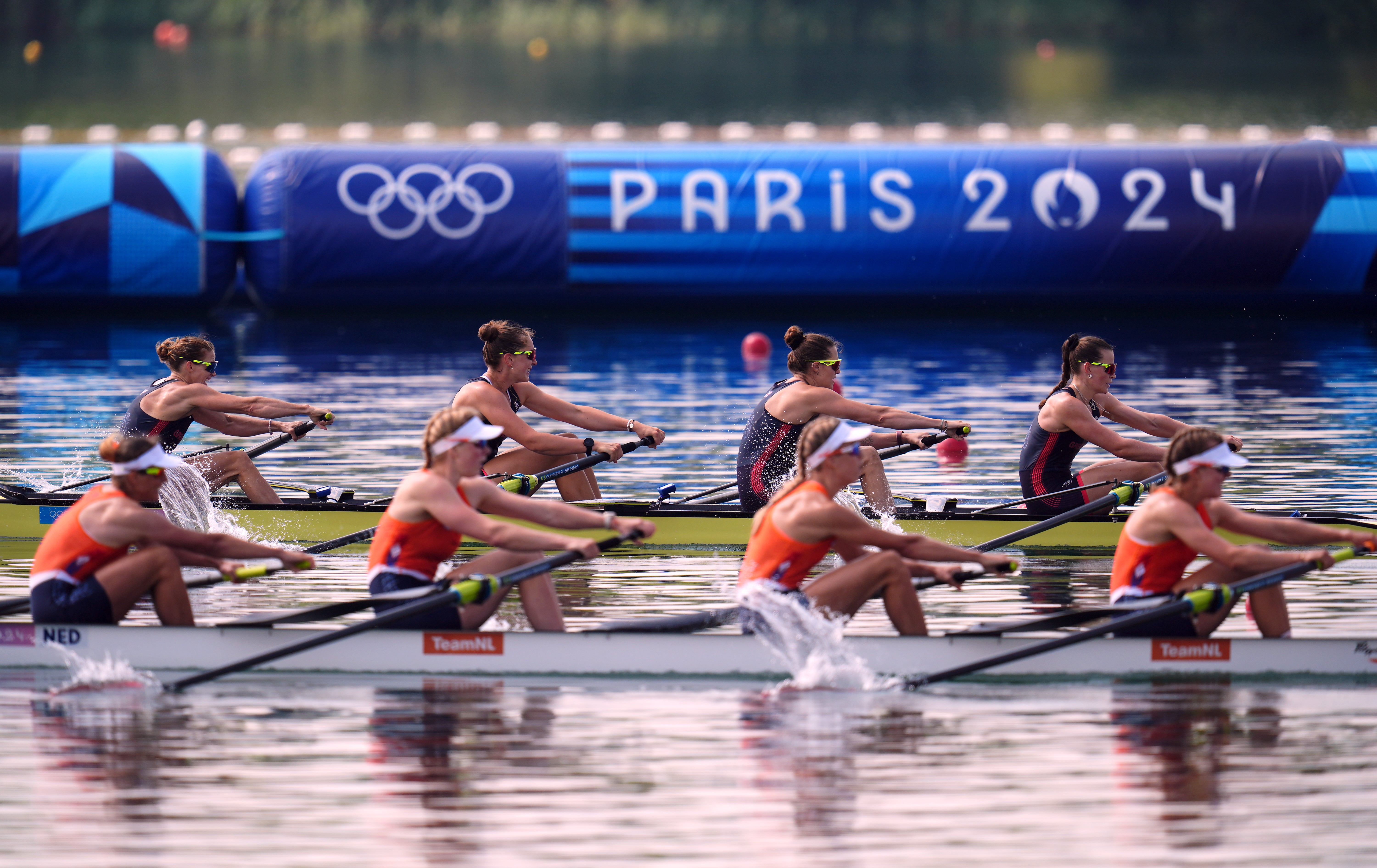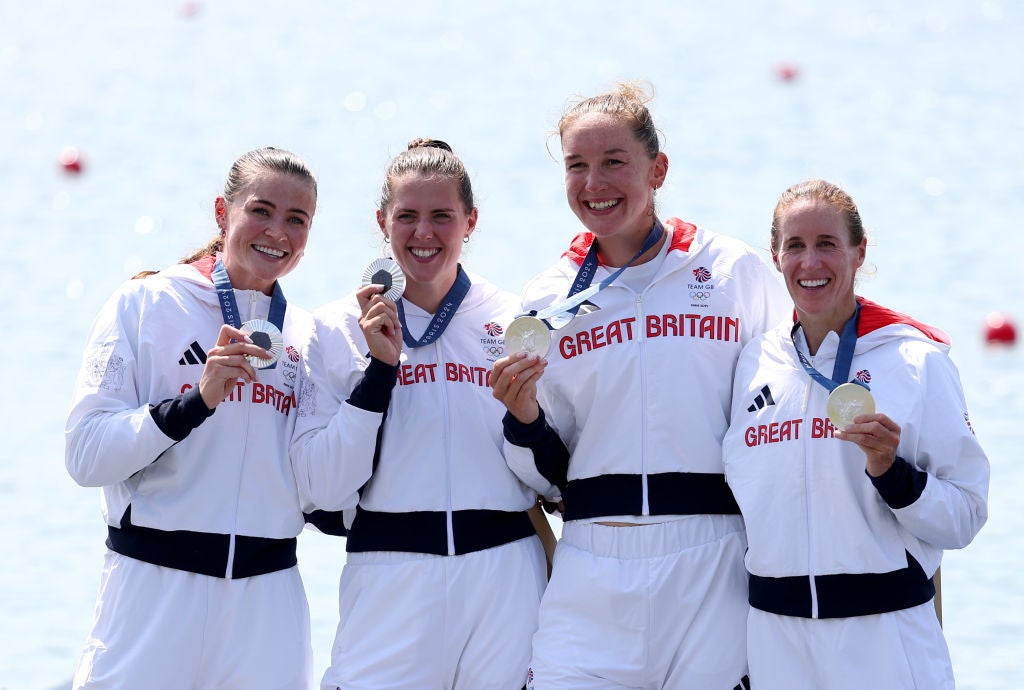Helen Glover denied in bid for historic gold as Team GB rowers claim three medals
Glover and the rest of the women’s coxless four were beaten on the line by the Dutch boat after a thrilling race

Your support helps us to tell the story
From reproductive rights to climate change to Big Tech, The Independent is on the ground when the story is developing. Whether it's investigating the financials of Elon Musk's pro-Trump PAC or producing our latest documentary, 'The A Word', which shines a light on the American women fighting for reproductive rights, we know how important it is to parse out the facts from the messaging.
At such a critical moment in US history, we need reporters on the ground. Your donation allows us to keep sending journalists to speak to both sides of the story.
The Independent is trusted by Americans across the entire political spectrum. And unlike many other quality news outlets, we choose not to lock Americans out of our reporting and analysis with paywalls. We believe quality journalism should be available to everyone, paid for by those who can afford it.
Your support makes all the difference.Helen Glover’s bid to win a third Olympics gold medal and add another sensational chapter to her trail-blazing rowing career ended in heartbreak as Great Britain lost out to the Netherlands in a thrilling finish in the women’s coxless four. There were bronze medals for Mathilda Hodgkins-Byrne and Becky Wilde in the women’s double sculls, as well as the Great Britain men’s coxless four.
While Glover claimed her third Olympics medal after returning to rowing for the second time and as a mother of three, the Great Britain team were left devastated as Netherlands won gold by just 0.18 seconds. The women’s four of Glover, Esme Booth, Sam Redgrave and Rebecca Shorten were previously unbeaten in 2024 coming into the Olympics, and were favourites for gold after winning the European Championship in May.
Glover, who won gold in the women’s pair at London 2012 and Rio 2016, returned to rowing for the second time ahead of Paris 2024. The 38-year-old announced her comeback inspired by a mission to “push the boundaries” for mothers in sport, having given birth to her first son, Logan, in 2018, followed by twins Willow and Kit in January 2020.

Handed the honour of carrying Great Britain’s flag along with Tom Daley at last week’s opening ceremony, Glover represented a talismanic figure for Team GB’s rowing squad as they looked to return to form at the Olympic regatta at Vaires-sur-Marne. Tokyo brought no gold rowing medals for Great Britain at an Olympics for the first time since 1980 but hopes were high for further improvement after gold yesterday in the women’s quadruple sculls.
In the first of three finals with British medal chances, Hodgkins-Byrne and Wilde claimed bronze in the women’s double sculls, with New Zealand pipping reigning champion Romania to gold in a reverse of their position at Tokyo three years ago. Hodgkins-Byrne had also returned to rowing following a maternity break and giving birth to her son, Freddie, in 2022. In the same race, the winning duo from New Zealand, Francis Brooke and Lucy Spoors, had also taken time off after Tokyo to start families and both gave birth to their first children within months of each other in 2022.
No doubt Hodgkins-Byrne, Brooke and Spoors had found inspiration from Glover’s comeback at Tokyo. The two-time gold medal winner became the first mother to row for Great Britain at an Olympics returning from a four-year absence because of a “lockdown project gone too far”. If showing she could make it back to an Olympics was a statement, returning ahead of Paris came with the intent of reaching the podium, of showing what could be possible.
But the British four were unable to pull in the Netherlands after heading into the final 100m neck and neck. With Glover in the back of the GB boat, the lead briefly changed hands on every stroke until the Dutch managed to close out their victory by a fraction of a boat length. As the Great Britain team slumped in exhaustion after crossing the line, there were mixed emotions to contend with: Booth, Redgrave and Shorten claimed silver on their Olympic debuts and Glover had succeeded in her mission of raising the bar for mothers in elite sport.
“On one hand we knew we had the potential to win,” Glover admitted. “But on the other hand we were realistic that nothing was a given. We raced the best race we could and we have to be really proud. It’s a massive achievement.”

While Glover had set different expectations after Tokyo and the opportunity to win a third Olympic gold may not come again, she could also take pride from changing the landscape that has not just her but other mothers competing for medals.
“I feel I worked so hard before Tokyo to break into the team as a mum and now I’ve been able to reap the rewards of that hard work,” Glover said. ”Rowing came second to a lot of battles I had to fight during that Tokyo year and now those battles have been fought, hopefully every single mum who comes back can have a journey that is based on performance rather than proving that mums can do it.
“Normalising it is really important. Sport is a massive reflection of society and to show you can come back to something – whatever it is, work, a hobby, sport – to show you can come back and excel not despite having children but because you had children. I think it is a message to society to say there should be a space and encouragement for women to come back and do whatever they want to do after having kids.”
Glover does not expect to return for another fifth Olympics in 2028, but said “half the team” believes she will continue balance elite competition with her life at home. “Right now I just want to spend time with family and spend time being mum. Not thinking about rowing.”
In the men’s four, Oli Wilkes, David Ambler, Matt Aldridge and Freddie Davidson settled for bronze after overcoming a poor start to make it onto the podium behind the United States and New Zealand. Great Britain looked set to be Olympic favourites after winning the 2022 and 2023 World Championships but have faltered this season and ultimately, the United States and New Zealand were well clear when they crossed the line in first and second, respectively.
Join our commenting forum
Join thought-provoking conversations, follow other Independent readers and see their replies
Comments